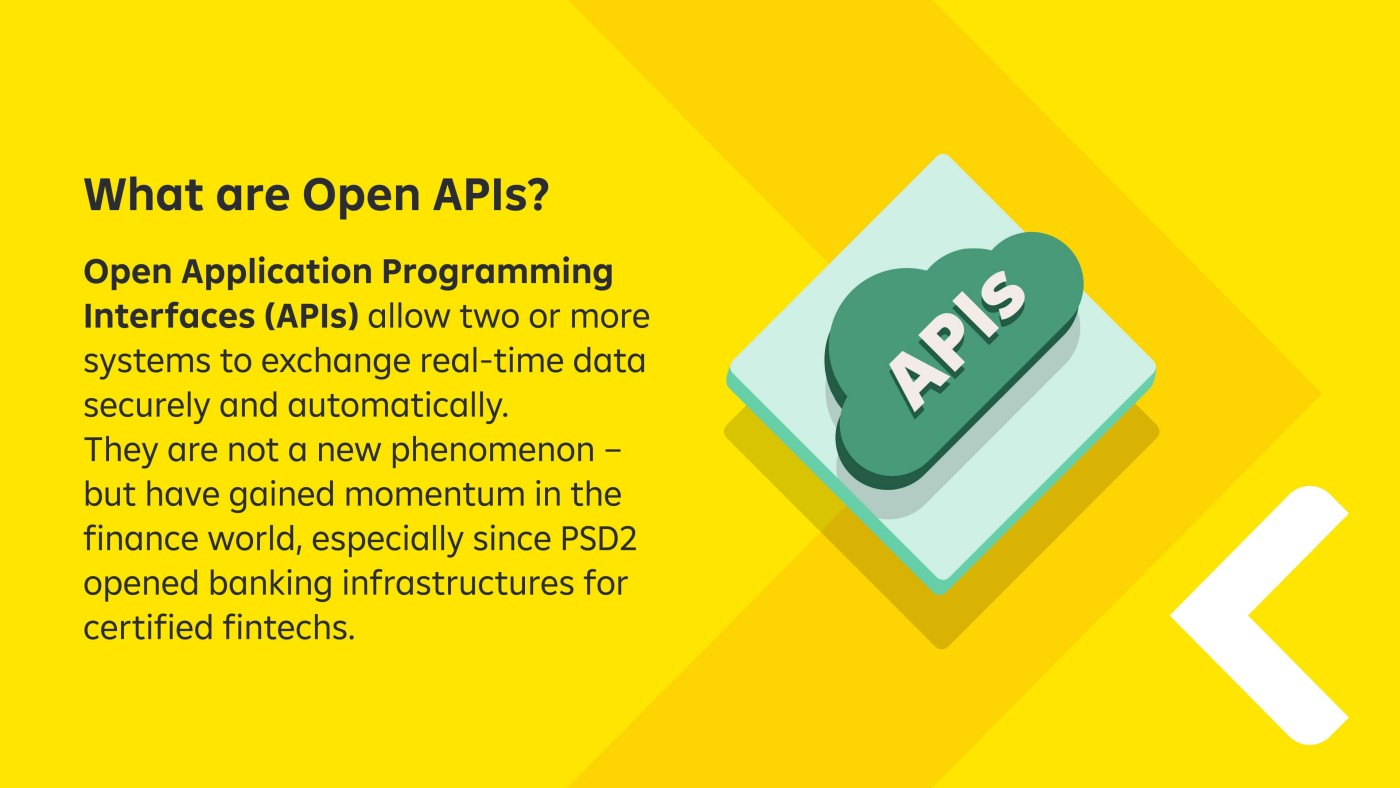
How Open APIs in cash management can boost your business
When competitors join forces, businesses benefit from real-time treasury and faster liquidity management – find out how Open APIs will change your cash management.
In the fast-evolving landscape of financial technology, it may seem like traditional banks and fintech firms are locked in a perpetual race for supremacy. When open banking disrupted the market, many
wondered whether this was the beginning of the end for classic financial institutions.
Fast forward a couple of years, and it turns out that the disruption fostered innovations that made a symbiotic relationship between these players possible – with numerous benefits for their clients on both sides.
Today, banks and fintechs do not compete, but cooperate to create a more efficient and customer-centric financial ecosystem. In this article, we take a closer look on Open Banking and Banking APIs specifically:
- Why they can boost your business
- What to look for in an open banking partner
- A best practice by Porsche Corporate Finance
- The roadmap for the future
Open APIs make real-time banking a reality
While Open APIs are nothing new in general, they keep shaping tomorrow’s banking: By offering a new form of connectivity, they allow direct real-time data exchange and thus revolutionize the way businesses manage their liquidity and optimize their internal processes.
The payment services directive (PSD2) certainly paved the way for this development, opening banking infrastructures toward towards certified fintechs and non-bank partners.
Especially in the cash management context, the various advantages are not lost on treasurers and financial decision makers: An increasing amount of businesses are looking to implement a real-time channel.

The benefits for companies using Banking APIs
- Increasing speed and efficiency – with real-time access to data and functionalities and by automating
processes - Making more informed, data-based decisions – fully transparent monitoring enables more effective cash forecasting and risk management
- Reducing costs – through quicker onboarding and lower implementation fees
By making use of bank-fintech-cooperations, companies can multiply the possibilities even further: It enables them to ‘bring home’ their operations to their own treasury software system. This way, API
technology offers a true plug & play experience.
In addition, the technology is not limited to payment services and liquidity management only – continuous innovation will keep opening new use cases and functionalities.
What are the risks with open banking – and how to counter them?
As with any online activities, users are mostly concerned with data protection and the possibility of security breaches or fraud. Companies looking to make use of Open API technology should be well-informed when choosing an open banking partner.
The advantage of working with a bank that offers Open API powered products is that these institutions are required to make security a top priority. Established banks apply multi-layered security measures and cooperate with trusted fintech partners only.
At RBI for instance, all external APIs undergo an external penetration-test, including activities like simulated hacker attacks, in addition to having set up a threefold security approach, significantly reducing outside threats.
However, some responsibility remains also on the client side: being one crucial part of the data-exchange-chain, clients must secure themselves as well to secure the whole chain.

How banks and fintechs work together – a best practice by Porsche
By co-creating API powered services, banks and fintechs offer their mutual clients a much broader product-suite and extended reach.
Recently, Porsche Corporate Finance successfully activated RBI’s Open API-based real-time banking directly in their own treasury management system. This was made possible by a cooperation of RBI and TIS (Treasury Intelligence Solutions), with the latter acting as a Treasury Aggregator.
Banks and fintech partners working together to meet their clients where they are, understanding the needs and challenges of businesses, and using that understanding to create next-gen solutions – this is what future-oriented customer experience is all about.
The roadmap for the future
Banking APIs will continue to enhance the ‘bread and butter’ business of account information and payments. Extended services that for instance the RBI x TIS cooperation has on the roadmap are pre-validation services (beneficiary account check before initiating the payment) and bank account information services.
Further upcoming use cases include:
- FX conversions (cross-border transactions with real-time fixing)
- Fraud prevention services
- On-time credit notifications
The future of real-time banking is looking very bright indeed – and APIs will become the ‘new normal’ in the treasury world. With traditional banks and fintech companies joining forces to deliver added value, businesses can embrace this technology to accelerate their own growth.

About our expert

Björn Zaksek is a cash management and Open API expert by trade, but family man and tennis player by passion. When he is not on the tennis court, he is available for your in-depth questions about open banking.
Related News
Be the first
Subscribe to Raiffeisen Insights. Get an e-mail with
the latest trends in the world of economics and business.